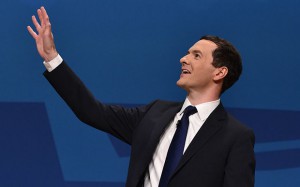

I’ve been trying to work out what drives the looney right in this country, apart, of course, from the fact that they are looney.
What, for example, would prompt a party in government committed to a slogan like ‘we’re all in it together’, to think in the lead-up to an election, that even more austerity, hammering the already well-hammered poor, ‘protecting’ not increasing inadequate health service spending and leaving the European Court of Human Rights so that ‘political control’ resides with parliament (i.e. them), are vote winners? That’s without even mentioning the EU and education!
I think I understand Nigel Farrago; he’s capitalising on the general disenchantment brought about by widening inequality and increasing austerity after bankers (largely Tory) ruined economies across the world. He’s a populist, happy to hoover-up the voters who’ve lost faith in mainstream parties. It happened in the UK and Germany in the thirties; Mosely was our Nigel then and the Germans went for a little Austrian bloke. Farrago is probably as genuine as he seems and a lot more likeable than oily (but earnest and statesmanlike) Dave or beseeching Ed. Personally though, I wouldn’t trust him to run the pub he drinks in let alone organise a party in a brewery. He might well be a genuine neo-con. and the health service would certainly not be safe in his very shakeable hands. He would though, stop all these foreigners ruining the country and leave the EU. Dave would too of course, whatever the cost, if he felt it right and the British people voted for it (looks earnest and statesmanlike as he says it).
Anyway, I actually think there might be obvious explanations for the right’s obsession with Europe, immigration and benefits. The last one, benefits is easy – by and large the looney right are not on benefits. They are thus a tad out of touch…………
Just after the war Winston asked to see what rations looked like.
“Not a bad meal, not a bad meal”,
he remarked when shown the latest rationing plans after the war.
“But these are not rations for a meal or even a day,”
an embarrassed colleague explained.
“These are for a week!”
There’s a fabulous book on London hotels during the war, ‘The West End Front: The Wartime Secrets of London’s Grand Hotels’, by Matthew Sweet which details the life of the rich and ‘important’ during the war years. Life went on pretty much as it had always done at Claridges and the Ritz, except, of course, that foreign maitre d’hotels and chefs were interned. Basements were turned into luxurious air-raid shelters and the bubbly continued to flow. In the meantime government resisted access to the tubes at night and the provision of deep shelters for ordinary Londoners until the tubes were forcibly occupied and the East-end communists ‘invaded’ (for one night only) the Ritz (I think it was the Ritz) and were allowed into its shelter. Maybe George, the second-hand car salesman, thinks benefits are paid daily?
The fixation on the impact of immigration on our small and over-crowded island is trickier. On the whole the wealthy are pretty well insulated from all this too but voters aren’t and our ‘man-of-the-people’ Nigel, ex-city and ex-Tory Party member, has the ability to voice the fear and insecurity of largely white, conservatives (small c) who have seen dramatic changes to their communities coinciding with largely negative economic change; for them 2 and 2 do make 5 – it’s obvious whose fault it all is.
Immigration has been an issue in this country since at least the Second World War; actually since at least the sixteenth century when I come to think of it.
“Sundry persons being strangers … have of purpose brought their wives from the parts beyond the seas, to be delivered with child within this city, and in other places within this realm of England, and thereof do take special testimonials thereby to win to those children the liberty that other Englishmen do enjoy”.
Complaint, brought before the Court of Aldermen in London in 1576.
Post-war, the issue was how to attract New Commonwealth migrants as cheap labour but turned to a concern, and then a fear, that there might be too many of ‘them’ given the colour of their skin. Not unreasonably, men and women who had fought for the motherland during the war were interested in a better life here after the war. Successive governments agonised over what to do at a time when lodgings posted notices saying ‘no blacks, no Irish and no dogs’. Most governments backed off actually doing anything but the Wilson government introduced both immigration curbs and anti-discrimination legislation. Wilson said this at Conference:
”…everyone living in this country, everyone who has come in or will come in is a British citizen, entitled to equality of treatment regardless of origin or race or colour.”
It would be nice to think a politician would dare to say that now.
That government did other things too. Here are some examples from its first term:
- giving pensioners the right to free or concessionary bus fares;
raising pensions; - abolishing the earnings rule for widows and increasing the widows’ pension;
- abolishing prescription charges;
providing security of tenure for families in their homes and putting an immediate stop to evictions; - repealing the Tory Rent Act and providing machinery for fixing fair rents, and enabling the power to fight the evils of Rachmanism;
- legislating for statutory redundancy pay.
It would be nice to think a politician would dare to….oh I’ve already said that.
Why though, the equation of EU with evil empire? I think it might be because they know something’s wrong and have to blame someone or something. Clearly it must be the fault of foreigners that we no-longer have an empire, are not top-dogs and the price of a Porche is getting ridiculously close to some people’s meagre annual bonus. The EU hampers our freedom and the flexibility of our labour market; it’s stopping us getting rich, or in the case of the looney right, richer. Actually, they are right to blame foreigners for some of this – they’re just looking in the wrong direction; they need to look west not east in fact. During the First World War, Britain incurred debts equivalent to 136% of our gross national product and our major creditor, the USA, began to emerge as the world’s strongest economy. Even then, we weren’t quite all in it together. By the end of the war we were in quite different ‘its’ rather than standing in the same stuff! There’s quite a difference between clover, which the US was in, and our, less sweet-smelling, footing. For the UK, the end of the war, even without the flu deaths, was not about getting back to the way things were. More British than German workers were involved in strikes in 1919. Unemployment in 1921 reached its highest point (11.3%) since records had begun. Staple industries contracted and working women were forced gave up their jobs to returning soldiers.
Cuts in public spending were introduced in 1922 to ward off inflation and pay down debt and an ambitious reform programme, which included major public housing and health schemes, was not implemented – no homes fit for heroes. We never did repay to the US our First World War debts (or recover the money we lent to allies, including Russia) but in 2006 we finally paid off our World War 2 debt to the US. The price of US generosity in the Second World War was huge, even if we discount our bankruptcy. In exchange for US loans and lend-lease we gave all out technical secrets to the US, military and otherwise, including our advanced nuclear fission work (just after the war a US bill forbade any sharing of their nuclear research with any foreign country including us) and ceded territory and bases to our ally. Roosevelt joked, when he was told during the war that Britain was broke, that he’d just have a quick chat with Winston and take over the Empire. The Americans were, because of their own history, anti-imperialist and part of the price exacted was the end of Empire, ours anyway – hard to argue with that really. However it left the door open for the US to become a cultural and commercial imperialist on an unprecedented scale, not to mention an occupier of foreign territory: in 2011 a Republican claim that the the U.S. had 900 bases across 130 nations was checked against available statistics by Politifact.com and found to be credible – not bad for an anti-imperialist empire, I mean country.
It is a bit difficult to blame the US for our troubles though, especially if we are right-leaning in our politics; we’ve adopted their approach to business and education and are planning to do the same in health so it’s much easier to blame the Europeans and the bureaucracy of the EU with all its ridiculous legislation about
- health and safety,
- human rights,
- employment law,
- environmental protection,
- consumer protection,
- bendy bananas (just joking)
and so on, which all gets in the way of our right to make our own decisions as British, well English really, right-wing loonies.
When Winnie went to the East End during the blitz, put two fingers up and said,
”We can take it’’,
the response was,
‘‘You don’t bleedin-well ‘ave to!’’
After the war, in a bankrupt country, a labour government somehow found the money to give us a welfare system and the National Health Service.
It would be nice to think a politician would dare to….oh I’ve already said that, said that, said that………